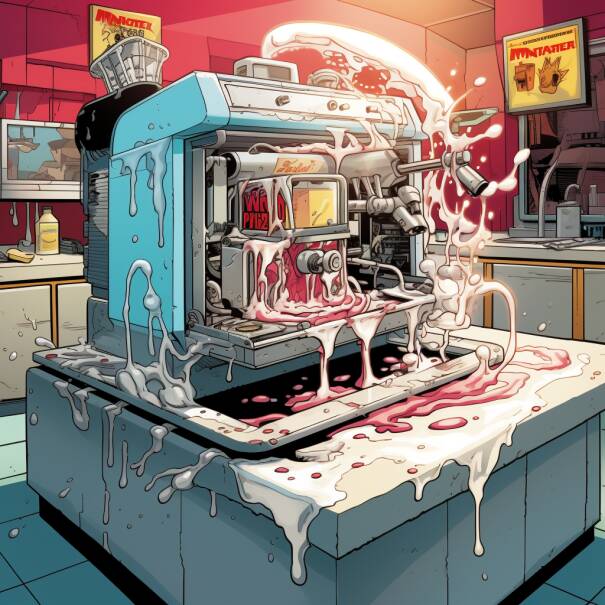We All Scream For Ice Cream – So Why Are McDonald's Machines Always Broken?

Having won victories for iPhone and tractor owners alike, the right-to-repair crusaders at iFixit are turning to the really important stuff as summer enters its last death throes – ice cream.
Leading on the worrying statistic that 10 percent of McDonald's ice cream machines are broken at any given moment, the teardown terrors protest that it doesn't have to be this way.
In a sort of John-Deere-for-frozen-milk situation, iFixit says commercial ice cream machines are often only really "broken" because a bunch of software locks say so.
In reality, what might be a simple fix is obfuscated behind "passwords and cryptic error messages," and control of these is what forms the bulk of the manufacturer's revenues through pricey callouts.
But bypassing such software locks is a no-no under the US's Digital Millennium Copyright Act (DMCA).
So, in the name of sweaty punters who might visit the golden arches in the hope of a frozen treat but are turned away by an ashen-faced crew member, iFixit and IP law non-profit Public Knowledge are soft serving the US Copyright Office with a petition [PDF] to "expand the repair exemption for consumer electronic devices to include commercial industrial equipment."
Yes, the broken McDonald's ice cream machine is only iFixit's clickbaity inroad – the activists envision a world where the owners of all commercial industrial machinery are allowed to fix their equipment themselves without the threat of being sued. How dare they be so reasonable.
- After years of fighting Right to Repair, Apple U-turns-ish in California
- Another redesign on the cards for iPhone as EU rules call for removable batteries
- Microsoft dabbles in self-repair with Surface devices now DIY-friendlier
- Minnesota governor OKs broad right-to-repair tech law
Managing to appropriate a Taylor-made ice cream machine for the purposes of the campaign, iFixit said: "Getting this exemption request granted would let us do more with our machine: instead of just taking it apart, we could also dig into the software. We could reverse-engineer the error codes and figure out how to reset them.
Teardown
"But it still won't solve the problem – most McDonald's franchise owners aren't hackers and won't be able to figure out how to read and address the machine's error codes on their own."
So iFixit did what iFixit does best – and took the machine apart. What they found was "lots of easily replaceable parts" such as a "heat exchanger with copper piping, a motor and belt, and three printed circuit boards," noting that "there's nothing here that's beyond the pale for someone who knows their screwdrivers."
And we would never accuse iFixit of that. The company has a video detailing how the machine works and delves into its innards too, if you're so inclined.
"Even if the copyright office agrees to grant the exemption request we filed today, we won't be able to share with you what we find in the brains of our own machine unless we change copyright law altogether," iFixit lamented.
"That's why we're also asking Congress to reintroduce the Freedom to Repair Act, which would make repair tools legal, too, permanently exempting all repair activities from Section 1201 of the DMCA. Until we get that full exemption, ice cream machine repair will stay broken."
It added: "We're not just fighting for a smooth treat; we're fighting for the right to fix things, the liberty of ownership, and… well, yeah, also for that smooth treat."
And who can argue with that? ®
From Chip War To Cloud War: The Next Frontier In Global Tech Competition
The global chip war, characterized by intense competition among nations and corporations for supremacy in semiconductor ... Read more
The High Stakes Of Tech Regulation: Security Risks And Market Dynamics
The influence of tech giants in the global economy continues to grow, raising crucial questions about how to balance sec... Read more
The Tyranny Of Instagram Interiors: Why It's Time To Break Free From Algorithm-Driven Aesthetics
Instagram has become a dominant force in shaping interior design trends, offering a seemingly endless stream of inspirat... Read more
The Data Crunch In AI: Strategies For Sustainability
Exploring solutions to the imminent exhaustion of internet data for AI training.As the artificial intelligence (AI) indu... Read more
Google Abandons Four-Year Effort To Remove Cookies From Chrome Browser
After four years of dedicated effort, Google has decided to abandon its plan to remove third-party cookies from its Chro... Read more
LinkedIn Embraces AI And Gamification To Drive User Engagement And Revenue
In an effort to tackle slowing revenue growth and enhance user engagement, LinkedIn is turning to artificial intelligenc... Read more

